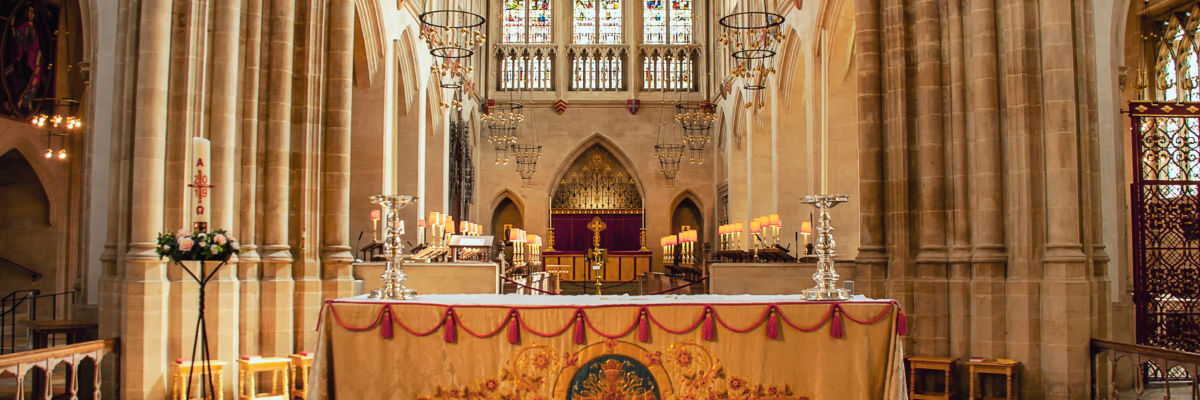
A college student asks Joe Heschmeyer to explain what Catholics define as worship and prayer. Must Catholics only worship in a church? Joe Heschmeyer gives the Catholic Answer.
Transcript:
How would you say the Catholic community defines and practices worship and prayer?
So a good place to look in terms of what we mean by the word worship is, sin Augustine has a book called City of God, and in book 10, that’s very much what he’s asking. What do we mean when we talk about worship? What is it that we’re doing with God that we don’t do with other people? Because it’s got to be something more than talking, because we talk to other people. It’s got to be something even more than honoring, because we honor other people. Now, by all means, part of our relationship with God involves talking to him, part of it involves honoring him. But Augustine argues that the distinctive feature, and this is true in Christianity, even in some way in paganism, the distinctive feature is sacrifice.
And he has a very good definition in book 10, chapter 6, where he says, “A true sacrifice is every work which is done that we may be united to God and holy friendship, and which has a reference to that supreme good and end in which alone we can be truly blessed.” So it’s not enough that we’re doing, you know, a good thing. It’s not even enough that we’re allowing ourselves to be inconvenienced, but we’re doing this to grow in friendship with God. That’s what makes it sacrificial in the sense of worship. And so when we do that, like, that’s at the very heart of what we mean by worship. So then how does that look? Well, in two ways. One, at kind of the public or communal level, the sacrifice of the mass is what Vatican II calls the source and the summit of the Christian faith. This is the high point of Christianity, and this is where we receive the spiritual power to live the Christian life in a very real way. And so in the mass, it’s a sacrifice, not in the sense of like re-killing Christ, but in the ancient world, in both Judaism and in paganism, you would have these food sacrifices where, like, the Passover lamb would be killed, and then you would have to eat the lamb. And so Jesus is the Lamb of God. He dies for sins on Good Friday on the cross, but then how do we
live in that? How is this applied to us? And so, you know, if you understand the language of sacrifice, in this kind of context, it would be eating the sacrifice. And so that’s what we do. In the Eucharist, we receive the sacrificial action of Jesus, and we unite with his sacrificial action, our own actions. And so, symbolically, you have the bringing forward of the bread and wine, the work of human hands, to show, like, we are allowing ourselves to be inconvenienced in some way. We are allowing something to be done in a sacrificial way to grow in friendship with God, and we’re uniting our tiny little sacrifices to Jesus’s perfect sacrifice so he can transform it. And so the bread and wine which represent our sacrifice are transformed through the power of the Holy Spirit into the body and blood of Christ, which is his sacrifice to the Father. He doesn’t just give up a little bit of food, a little bit of wine. He gives up his own life for us. And so, that’s how this works at kind of the public level of worship, is a deeply sacrificial thing. But additionally, we believe that all of us, by virtue of baptism, your body is a temple. And so, your body is a temple in which, if you’re living in the state of grace, God is dwelling within you. And so, you can offer sacrifices in your body. And so, in Romans chapter 12, verse 1, St. Paul talks about making sacrifices in your body, and that’s your spiritual worship. So, when you allow yourself to put others first or to put God first over your own preferences, and you’re doing it with this view towards growing in friendship with God, that is spiritual worship. That is bodily worship. That is the sacrificial offering that you’re making within the temple of your body.
Because you say worship, it’s with the Eucharist and sacrifice, and you say bodily worship. Does that mean we can worship outside of the church then? It can only be outside.
Yeah, you don’t have to be en masse to worship. One of the beautiful things St. Paul talks about at one point is this saving grace is being attached to even things like childbirth. That this is an area of tremendous suffering out of love for other people. That can cause you to grow in friendship with God because I think any mom who’s given birth to a baby has a deeper appreciation for the agony of the cross and this bearing of tremendous suffering for the sake of others, out of love. And so, that is a sacrifice that people voluntarily say yes to out of love. And doing that is a way of growing in friendship with God, and that’s what we mean by sacrifice. So, by all means, when we’re talking about worship, it doesn’t just have to be in the church on Sunday. It can be anywhere, anytime, as long as we have the right kind of spiritual orientation towards God.



